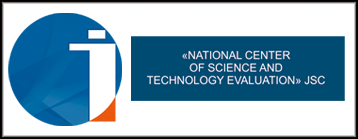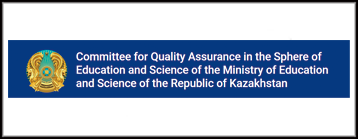Specific features of uranyl ions extraction by interpolymer system based on polyacrylic acid and polyethyleneimine hydrogels
DOI:
https://doi.org/10.31643/2021/6445.42Keywords:
hydrogels, interpolymer systems, sorption, polyacrylic acid, polyethylenimine, uranyl ion.Abstract
Uranyl ions sorption of by interpolymer system consisting of polyacrylic acid hydrogel (hPAA) and polyethyleneimine hydrogel (hPEI) has been studied. Rate of uranyl ions extraction by the initial polymers and interpolymer system hPAA-hPEI, polymeric chain binding rate and dynamic exchange capacity of initial polymers and interpolymer system hPAA-hPEI were calculated. Based on obtained outcomes it was found that area of maximum rate of uranyl ions extraction is within the ratios of 67%hPAA:33%hPEI and 33%hPAA:67%hPEI. Maximum uranyl ions extraction rate after 48 hours of hydrogels remote interaction was 90.0 %, when polymeric chain binding rate was 9.1 % and dynamic exchange capacity was 1.14 mmol/g. Rate of uranyl ions extraction by the initial polymer hydrogels 100 % hPAA and 100 % hPEI was 68.0 % and 52.0%. Obtained outcomes showed changes of initial polymeric hydrogels sorption properties in intergel system leading to functional groups obtaining higher reactive ability, which makes it possible to use them for further development of highly efficient uranyl ions extraction sorption technology.
Downloads
References
Naumov,А.V.(2008). Obzor mirovogo rynka redkozemelnykh metallov [Overview of the world market for rare earth metals] Izvestiiavuzov. Tsvetnaiametallurgiia. –Non-ferrous metallurgy, 1, 22-31 (In Russ.).
Berdikulova F. A., Ikhlasova A.T. (2020). Study of the process of rhenium extraction.Kompleksnoe Ispol’zovanie Mineral’nogo Syr’a = Complex Use of Mineral Resources, 3 (314), 22-27. https://doi.org/10.31643/2020/6445.23 (In Kazakh).
Kenzhaliev B. K., Surkova T. Yu, Berkinbayeva A.N., Dosymbayeva Z.D., Chukmanova M.T. To the question of recovery of uranium from raw materials. News of the National Academy oF Sciences of the Republic of Kazakhstan, Series of geology and technical sciences. Volume 1, Number 433 (2019), 112 –119. https://doi.org/10.32014/2019.2518-170X.14 (In Eng.).
Lapidus, G.T., & Doyle, F.M. (2015). Selective thorium and uranium extraction from monazite: II. Approaches to enhance the removal of radioactive contaminants. Hydrometallurgy, 155, 161-167. https://doi.org/10.1016/j.hydromet.2015.03.015 (In Eng.).
Garcia, A.C., Latifi, M., Amini, A., & Chaouki, J. (2020). Separation of Radioactive Elements from Rare Earth Element-Bearing Minerals. Metals, 10(11):1524. https://doi.org/10.3390/met10111524 (In Eng.).
Yanliang, Wang, Chao, Huang, Fujian, Li, Yamin, Dong, & Xiaoqi, Sun. (2017). Process for the separation of thorium and rare earth elements from radioactive waste residues using Cyanex® 572 as a new extractant. Hydrometallurgy, 169, 158-164. https://doi.org/10.1016/j.hydromet.2017.01.005 (In Eng.).
Samoilov, V.I., Saduakasova, A.T., & Kulenova, N.A. (2015). Analizsostoianiia tekhnolohii sorbtsionnohoizvlecheniiaurana v hidrometallurhicheskikh uranovykh proizvodstvakh[Analysis of the state of the technology of sorption extraction of uranium in hydrometallurgical uranium production]. Mezhdunarodnyi zhurnal eksperimentalnoho obrazovaniia. –International Journal of Experimental Education, 5-1, 80-87 (In Russ.).
Abdikerim, B.E., Kenzhaliyev, B.K., Surkova, T.Yu., Didik, N., Berkinbayeva, A.N.,Dosymbayeva, Z.D., Umirbekova, N.S. (2020). Uranium extraction with modified sorbents. Kompleksnoe Ispol’zovanie Mineral’nogo Syr’a = Complex Use of Mineral Resources, 3(314), 84-90. https://doi.org/10.31643/2020/6445.30 (In Eng.).
Turaev, N.S., Zherin, I.I. (2006). Khimiya i tekhnologiya urana (Uranium chemistry and technology). Moscow: Ore and Metals, 396. (In Russ.).
Alimbekova, B.T., Korganbayeva, Zh.K., Himersen, H., Kondaurov, R.G., & Jumadilov, T.K. (2014). Features of polymethacrylic acid and poly-2-methyl-5-vinylpyridine hydrogels remote interaction in an aqueous medium. Journalof chemistry and chemical engineering, 3, 8, 265-269 (In Eng.).
Jumadilov, T.K., Kondaurov, R.G., Abilov, Zh.A., Grazulevicius, J.V., & Akimov, A.A. (2017). Influence of polyacrylic acid and poly-4-vinylpyridine hydrogels mutual activation in intergel system on their sorption properties in relation to lanthanum (III) ions. Polymer Bulletin, 74, 4701-4713. https://doi.org/10.1007/s00289-017-1985-3 (In Eng.).
Jumadilov, T., Kondaurov, R., Imangazy, A., Myrzakhmetova, N., & Saparbekova, I. (2019). Phenomenon of remote interaction and sorption ability of rare cross-linked hydrogels of polymethacrylic acid and poly-4-vinylpyridine in relation to erbium ions. Journal of Chemistry and Chemical Technology,13, 4, 451-458. https://doi.org/10.23939/chcht13.04.451 (In Eng.).
Downloads
Published
How to Cite
Issue
Section
License
Copyright (c) 2021 Utesheva , A., & Juozas, V.

This work is licensed under a Creative Commons Attribution-NonCommercial-NoDerivatives 3.0 Unported License.
















